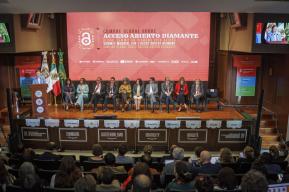Article
Bootcamp opens doors for budding African entrepreneurs in nanotech

The 37 women and 34 men hailed from Egypt, Sudan, Ethiopia, the Democratic Republic of Congo, the Republic of Congo, Malawi, Mauritius, Mozambique, South Africa and Zambia. Twenty-two of them travelled to Cairo for the bootcamp, while the remainder participated virtually.
UNESCO had selected 12 teams for the course from a total of 29 online applications for the quality of their background, experience and ideas.
Most successful applicants were Master’s or PhD students, or young researchers who had studied nanotechnology or related fields, such as biotechnology, chemistry, environmental science and engineering, energy, agronomy or physics. Four had a business background. All harboured a strong desire to create their own nanotech company.
We owe the word ‘nanotechnology’ to Japanese scientist Norio Taniguchi, who coined the term in 1974 to describe engineering on a scale smaller than one micrometre (one-millionth of a metre). There are obvious advantages to being able to manufacture microscopic components. Nanotechnology allows us to miniaturize devices and structures, which can make manufactured products lighter, stronger and more flexible. Today’s smartphones would never have been possible without miniaturization.
A crash course in industrial nanotech, business and intellectual property
The bootcamp programme was broken down into three courses. The first focused on industrial applications of nanotechnology. It was introduced by Dr Amal Kasry, the UNESCO specialist in nanotechnology who had organized the bootcamp. She explained the importance of bootcamps such as these for UNESCO’s mandate of building capacity in basic sciences and engineering to support countries’ transition to sustainable development.
The course on industrial applications of nanotechnology was followed by a business course then a course on intellectual property protection. Each course comprised several sessions.
To kick off the first course, Amal Kasry invited assembled company founders and directors to share concrete examples of how they had applied nanotechnology to product development.
Professor Askwar Hilonga, Co-founder of the Gongali Model, described how his company had used nanotechnology to create low-cost water filters in Tanzania.
Dr Sabelo Mhlanga, Managing Director and CEO of SabiNano (Pty) Ltd in South Africa, presented various carbon-based nanomaterials manufactured by his company.
Dr Mohamed Taha, Co-founder and Executive Director of Nano Gate in Egypt, stressed the need to tailor a product to demand; his company offers nanomaterials to researchers in small quantities (grams) and in larger quantities to small and large industries.
Dr Steven Mufamadi presented different applications of nanomedicine, based on his experience as Founder and Managing Director of Nabio Consulting in South Africa.
He was followed by Professor Malik Maaza, UNESCO Research Chair in Nanoscience and Nanotechnology at the University of South Africa. He and three of his postdoctoral students introduced their respective patents in nanotechnology.

Tours of a nanotech lab
The trainees were then treated to a visit of the facilities and equipment for nanotechnology available at the British University in Egypt and Pennsylvania State University in the USA. The aim was to familiarize them with the sophisticated equipment available to some universities. Young African researchers who have limited access to this type of equipment may be unaware of its potential. This blind spot can inhibit their ideas for product development.
By necessity, the visit of the nanotechnology laboratory at Pennsylvania State University was virtual; it was conducted by Prof. Osama Awadelkarim, UNESCO Chair on Building Innovation and Manufacturing Capacities through Advanced Technology Education at this university.
For the visit of the laboratories at the British University in Egypt’s Nanotechnology Research Centre, it was Professor Hassan Nageh who did the honours, assisted by his colleagues.
Tips for developing and protecting an innovative product
Next up on the programme was the short business course. Mr Richard Brooks, Founder and Director of FD Solutions in the United Kingdom, taught sessions on financial terms and projections.
It was then the turn of Dr Surya Raghu, Director of Entrepreneurship and Tech Transfer at ET Cube International, a USA-based firm, to lead four training sessions on how to commercialize one’s intellectual property, speed networking, business models and group idea generation.
He was followed by Dr Ali El Emrani, Founder of the iBTIQUAR - Innovation Lab in Morocco, who introduced the trainees to the venture capital market.
The third course concerned intellectual property protection. Mr Eng Seif El Din Abdel Rehim introduced the different types of intellectual property: patents, trademarks, designs, geographical indications, utility models, plant variety rights, semiconductor topography rights, copyright and trade secrets.
Professor Hossam Shabaan then led a session on how to write legal contracts and advised some of the trainees and trainers at the bootcamp on how to protect their own intellectual property, including practical tips on how to locate and contact the intellectual property office in their country.
Dr Oleg Stukalov’s presentation offered a smooth transition from the business course to that on intellectual property. Business Development Manager at the Waterloo Institute for Nanotechnology in Canada, he retraced Mirexus Biotechnologies Inc.’s ten-year journey to take their product, PhytoSpherix®, a corn-derived nanomaterial, ‘from university lab bench to international sales’. His story culminated in the tale of how, in 2022, the company had sold both its core intellectual property for PhytoSpherix® and related applications in personal care and nutraceuticals to a Swiss manufacturer, Mibelle Biochemistry.
Design thinking: five days to come up with a ‘nanogreen’ project
The 71 budding entrepreneurs were asked to form five teams and to come up with an idea for an innovative green nanoproduct. Over the next five days, they gradually matured their ideas. One team came up with a method for producing special leather gloves that could be worn when using touch-screen devices in winter (see photo). The temperature inside the glove can also be monitored using a mobile phone application. Nanotechnology was used to ensure uniform electrical conductivity over the surface of the glove.
A second team proposed a new formulation for a cosmetic ointment and cream that could repair and regenerate the skins of burn victims. A third team designed a type of biofuel based on algae that used a novel nano-catlayst to improve yield. Algae is an ideal source of biofuel, as algae are so plentiful in the ocean and, unlike other biofuels, do not compete with food crops. A fourth team came up with the idea of a remediation product for oil spillages that would break down water-associated fractions during an advanced oxidation process. A fifth team thought of utilizing used batteries to produce desalinated freshwater.
On the last day, each of the five teams pitched their idea to the trainers. The jurors were most impressed by the four-member team from Sudan and Zambia which had come up with the idea for algal biofuels. Two members from this winning team will be rewarded with a two-week internship at the University of Mauritius’ business incubator to help them develop their ideas.
No lack of innovative ideas in Africa
There is no lack of either innovative ideas or budding entrepreneurs in Africa. There are no fewer than 744 technology hubs across the continent, according to the UNESCO Science Report (2021). However, most of these hubs are reliant on foreign donor funding, which is not a sustainable funding model. According to research by New World Wealth and Henley & Partners, there are more than 130 000 individuals in Africa with private wealth of at least US$ 1 million. There is, thus, a potential venture capital market in Africa.
According to the UNESCO Science Report, it is becoming easier to do business in Africa, as more governments create one-stop windows for business registration as part of their drive to digitalize public services to improve efficiency and reduce the informal economy.
The bootcamp was organized by UNESCO in collaboration with the British University in Egypt and six other partners. These were the University of Mauritius, Pennsylvania State University in the USA, ET Cube International, the United Nations Economic Commission for Africa, the African Materials Research Society and the Africa Chair in Nanoscience and Nanotechnology at the University of South Africa supported by UNESCO, iTLABS and the National Research Foundation.
Trainees were asked to make suggestions for improving the bootcamp. Some mentioned that they would have liked the bootcamp to devote more time to financial matters and to exploring how nanotechnology could enrich their business ideas. French-speaking participants also regretted the lack of interpretation.
Overall, the trainees express satisfaction with the course. One in four of the 40 trainees who provided feedback stated that the bootcamp exceeded their expectations and half said that their decision to attend the bootcamp had been largely influenced by the opportunity to network.
Will there be a second nanotechnology bootcamp in Africa? ‘We are currently looking for funding to hold another ten such bootcamps’, smiles Amal Kasry ‘and, in light of the feedback we have received, we are rather optimistic about our chances’.












